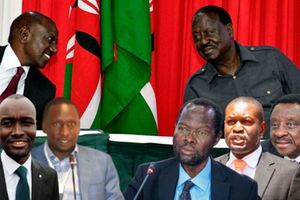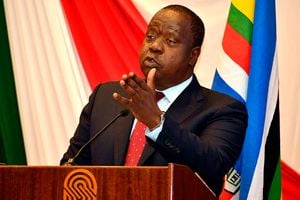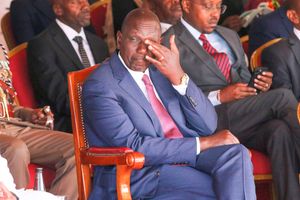
Then deputy president William Ruto prepares to cast his vote at a polling station in Turbo Constituency, Uasin Gishu County on August 9, 2022.
Three Kenyan citizens have filed a petition at the Supreme Court seeking constitutional interpretation and a declaration that the next General Election must be held in August 2026, not 2027.
The petitioners—Dr Owiso Owiso, Khelef Khalifa and Ashioya Biko—argue that conducting the next presidential election on any date other than the second Tuesday of August in the fifth year following August 9, 2022, would amount to an unconstitutional extension of President William Ruto’s term, contrary to the 2010 Constitution.
They have based their argument on Article 136(2)(a) of the Constitution, which states that an election of the President shall be held on the same day as a general election of Members of Parliament, being the second Tuesday in August, in every fifth year.
According to the petitioners, this provision sets out a mandatory and non-negotiable electoral cycle that must not be violated under any circumstance.
They further cite Article 259(5)(c) of the Constitution, which sets out the method for computing time in years, stating that if the time is expressed as years, the period ends at the beginning of the date of the relevant year that corresponds to the date on which the period began.
“The most recent presidential election in Kenya was held on August 9, 2022. Therefore, pursuant to Article 136(2)(a) of the Constitution, the next presidential election must be held on the second Tuesday of August in the fifth year from August 9, 2022, which is August 11, 2026,” the petitioners state in court papers filed on April 23.
They argue that based on the constitutional computation method, the first year ended on August 8, 2023 and the second on August 8, 2024. The third will end on August 8, 2025, and the fourth on August 8, 2026.
Accordingly, they argued, the fifth year commences on August 9, 2026, and runs until August 8, 2027.
“If the above formula for construing and computing time is correct, and the petitioners assert that it indeed is correct, then the fifth year from the previous election of August 9, 2022, commences on August 9, 2026,” they said.
In their view, this means that the second Tuesday of August 2026—August 11—falls within the constitutionally mandated fifth year. Holding elections in August 2027, they contend, would push the polls into the sixth year, thereby violating Article 136(2)(a) of the Constitution.
Moreover, the petitioners argue that adhering to the correct date is not merely a constitutional formality but is crucial to upholding rights under Article 38(2) and 38(3)(c) of the Constitution, which guarantee citizens regular elections and the right of qualified persons to vie for the presidency.
Delaying the election to 2027, they say, infringes upon these rights and constitutes an unconstitutional extension of the President’s term.
The petitioners also refer to Article 142(1) of the Constitution, which provides that the President holds office from the date of being sworn in until the next President is sworn in. However, they emphasise that the Constitution does not guarantee a full five-year term if that term would violate Article 136(2)(a).
To bolster their argument, they cite precedent from the 2013 and 2017 elections.
They note that although former President Uhuru Kenyatta was sworn in on April 9, 2013, the subsequent election was held on August 8, 2017—only four years and five months later.
Similarly, by the time of the August 9, 2022, elections, Mr Kenyatta had not completed a full five-year term, yet he vacated office after the polls and after President Ruto was sworn in. This followed the Independent Electoral and Boundaries Commission (IEBC), under the chairmanship of the late Wafula Chebukati, calling for a General Election in line with constitutional timelines.
This, they argue, demonstrates that adherence to the constitutional election date takes precedence over completing a full presidential term.
“As such, it is evident that the question regarding the date of the next presidential election is a live issue currently causing anxiety and uncertainty among the public,” they argue.
They assert that holding the next presidential election on the second Tuesday of August 2027 would contravene Article 136(2)(a), as that date would fall in the sixth year from the previous election held on August 9, 2022.
According to them, the sixth year begins on August 9, 2027, and ends on August 8, 2028.
The petitioners also cite Section 3A of the Supreme Court Act, which recognises the Court’s inherent power to make orders necessary for the administration of justice.
Additionally, they refer to Part III of the Elections Act, which provides strict timelines and frameworks meant to safeguard the integrity of the electoral process.
They argue that certainty in election dates is vital for planning and voter participation, as elections are not one-day events but a process. Certainty, they say, enables the electorate to make informed choices and strengthens the rule of law by promoting accountability, transparency and predictability in the electoral process.
They warn that failure to conduct the election in August 2026 would not only breach the Constitution but also violate Kenya’s obligations under international law, including Article 13(1) of the African Charter on Human and Peoples’ Rights, and Articles 2(3), 3(4), and 32(7) of the African Charter on Democracy, Elections and Governance (ACDEG).
Such a move, they claim, would constitute an unconstitutional change of government through manipulation of electoral timelines, potentially plunging the country into a constitutional crisis.
Accordingly, the petitioners are asking the Supreme Court to declare that Article 136(2)(a) of the Constitution mandates presidential elections to be held on the second Tuesday of August in every fifth year, and that the next presidential election must therefore fall within the fifth year following the previous General Election, not after the lapse of the fifth year.
They also seek a declaration that the computation of the electoral cycle begins from the date of the last election and ends on the corresponding date in the fifth year, in line with Article 259(5) of the Constitution.
Further, they want the apex court to affirm that the fifth year from the last election, which was held on August 9, 2022, begins on August 9, 2026, and that the second Tuesday of August 2026—August 11—falls squarely within that fifth year and is therefore the correct date for the next presidential election.
They are also seeking a declaration that any attempt to conduct the presidential election on a date other than August 2026 would violate multiple constitutional provisions and Kenya’s international human rights obligations, and would thus be null and void.
In addition, they want the court to clarify that Article 142 of the Constitution does not guarantee a full five-year term for the President if such a term would result in violating the constitutional timeline for elections, and that no other provision of law overrides this timeline.
Finally, they are seeking an order compelling the Independent Electoral and Boundaries Commission (IEBC) to organise and conduct the next presidential election on the second Tuesday of August 2026.
The petition, filed through Otieno Ogola & Company Advocates and Osundwa & Company Advocates, names the Attorney-General and the IEBC as respondents.
The Law Society of Kenya, Katiba Institute, Wiper Party leader Kalonzo Musyoka, Azimio leader Raila Odinga, the United Democratic Alliance (UDA), former Chief Justice David Maraga, activist Okiya Omtatah, politician Jimi Wanjigi, former Cabinet Secretary Fred Matiang’i, and the Kenya Human Rights Commission have been listed as interested parties.










